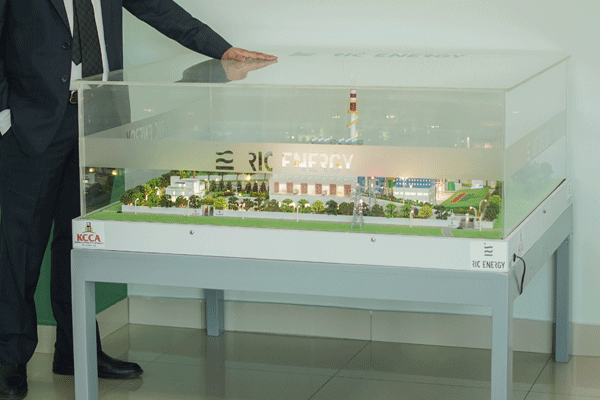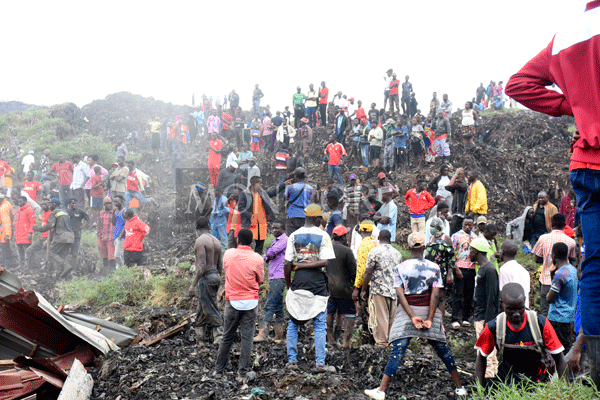Why Shs730b Ddundu waste project has failed to kick off

Ric Energy Group Project Development Adviser Esero Wakozi Musoke explains to the media about the proposed plan for an electric plant that will produce electricity from garbage in Mukono District. Photo/Abubaker Lubowa
What you need to know:
- Ric Energy plans to invest $200m (about Shs729.6b) in setting up a solid waste plant at Ddundu in Mukono District to generate electricity from garbage collected from KCCA and surrounding districts of Wakiso and Mukono.
A Spanish-based firm that intends to set up a solid waste management plant for the Kampala Capital Metropolitan Area has waited in vain for clearance from the Kampala Capital City Authority (KCCA) to commence the project.
Ric Energy plans to invest $200m (about Shs729.6b) in setting up a solid waste plant at Ddundu in Mukono District to generate electricity from garbage collected from KCCA and surrounding districts of Wakiso and Mukono.
Mr Esero Wakozi Musoke, the project development adviser, told journalists in Kampala on Tuesday that Ric Energy had already signed a Memorandum of Understanding (MoU) with KCCA, had submitted feasibility study reports, and was ready to commence work.
“We are now considering writing a letter, reminding them that we are ready because our Memorandum of Understanding is expiring in December this year,” Mr Musoke said.
He said they have not heard from KCCA since they submitted all documents in June.
Mr Rajesh Chugh, the chief executive officer of Ric Energy Group in Asia and Africa, said: “We completed all the studies before June, including monthly characterisation studies, which we have been doing for the last nine months. But we have been waiting for the project agreements from KCCA, particularly the waste supply agreements.”
Mr Daniel N Muhumuza, the KCCA’s acting deputy director of public and corporate affairs, confirmed they had signed an MoU with Ric Energy but said the authority was still consulting its stakeholders before clearing the project implementation.
“We need to get the input of the Electricity Regulatory Authority (ERA) and Electricity Transmission Company. We need to know whether we shall be able to buy at 11.5 cents per unit for a period of 20 years. We also have to secure approvals from the Ministry of Energy,” he added.
Mr Muhumuza said inputs from other stakeholders such as the Ministry of Local Government, and the National Environment Management Authority (Nema) are critical in every agreement they make.
“Whereas this MoU expires on December 22, 2024, there is a provision for extension under Clause 4 of the agreement. So there is no need to worry,” he explained.
Ric Energy maintains they entered into a MoU with KCCA on December 22, 2023, to conduct all the technical assessments to ensure readiness to proceed with implementation, including preparation of a draft agreement within a period of 12 months from the date of execution of the MoU.
In November 2023, Ric Energy officials met President Museveni who then issued a directive to KCCA to commence a solid waste management plan for Kampala Capital Metropolitan Area.
The President, in the November, 1, 2023, letter further directed the Ministry of Energy and the Electricity Regulatory Authority (ERA) to provide the requisite licensing for the effective implementation of the project.
On the issue of the energy tariff, Mr Museveni said KCCA should subsidise the excess energy tariff from its revenue resources.
About the project
Mr Chugh said the project is expected to generate 20MW per phase, and with the project cost for each of the phases estimated at $100m (about 364b).
The project is expected to sit on 35 of 130 acres of land that KCCA secured in Ddundu, Mukono District.
Mr Chugh said a pit would be created where all the municipal waste would be dumped. The waste will be retained for one to two weeks to reduce the moisture and improve the heat level of the waste.
Then it will be burnt in the two big incinerators and the steam generated would be used to produce power in the steam turbines.
The project would also have a power substation, equipment required to control the emissions of the project, a medical centre to offer free medical services to the staff and the community and a training facility for the more than 500 employees.
Residents speak out
The residents in the project area have asked KCCA and the project implementers to fulfil their demands. They want compensation for property that may be destroyed or taken over during road construction.
They also want KCCA to tame the smell of garbage, to provide alternative water sources in case those in project areas become inaccessible, and to educate the community about HIV prevention to check casual sex between some residents and project workers.
Mr Brain Mazige, a resident of Buntaba Village in Ddundu Parish, Kyampisi Sub-county, said: “We are going to get jobs and electricity but we would be happy if they cooperated with us.”
Mr Sam Ssentamu, the secretary of defence for Buntaba Village, who doubles as the chairperson of the Parents Teachers Association (PTA) at Buntaba Church of Uganda Primary School, said: “Parents will get jobs and be able to provide food and scholastic materials so that children don’t drop out of school.”
He also requested the project owners to consider supporting the recruitment of more teachers for the school since the six teachers employed by the government are inadequate.
In response, Mr Chugh said: “All their concerns will be addressed.”
The project outlook
According to the managers at Ric Energy,the proposed project will have a big pit, which will be created to accommodate all the municipal waste. Once the waste is dumped into the pit, it will be retained for a period of 1-2 weeks to reduce the moisture and to improve the heat level of the waste, before it is burnt in the incinerators.
The steam that will be generated will be used to produce power in the steam turbines. There are two big incinerator lines which are planned for the project.
The rest of the equipment are required to control the emissions so that the project complies with the European Union’s emission norms.
The project owners have also planned to construct medical centre to offer free services not only to the staff but also for the neighbourhoods. It will also have a training centre, where more than 500 people are expected to be trained, and an admnistration building with all the facilities for the staff.




